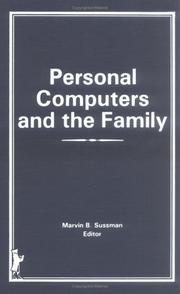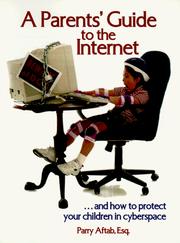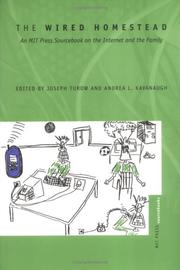| Listing 1 - 10 of 12 | << page >> |
Sort by
|

ISBN: 086656361X Year: 1985 Publisher: New York (N.Y.): Haworth
Abstract | Keywords | Export | Availability | Bookmark
 Loading...
Loading...Choose an application
- Reference Manager
- EndNote
- RefWorks (Direct export to RefWorks)
Computers and families --- Microcomputers --- Social aspects

ISBN: 0966049101 Year: 1997 Publisher: New York (N.Y.): SC press
Abstract | Keywords | Export | Availability | Bookmark
 Loading...
Loading...Choose an application
- Reference Manager
- EndNote
- RefWorks (Direct export to RefWorks)
Computers and children --- Computers and families --- Internet and children --- Parenting
Book
ISBN: 9780190665296 0190665297 Year: 2018 Publisher: New York Oxford University Press
Abstract | Keywords | Export | Availability | Bookmark
 Loading...
Loading...Choose an application
- Reference Manager
- EndNote
- RefWorks (Direct export to RefWorks)
"Tech Generation: Raising Balanced Kids in a Hyper-Connected World guides parents in teaching their children how to reap the benefits of living in a digital world while also preventing its negative effects. Mike Brooks and Jon Lasser, psychologists with extensive experience working with kids, parents, and teachers, combine cutting-edge research and expertise to create an engaging and helpful guide that emphasizes the importance of the parent-child relationship"-- Threats of cyberbullying, video game violence, pornography, and sexting may seem inescapable. But for some, the tendency to overuse screens is interfering with the ability to meet basic needs.: sleep, physical activity, and perhaps most importantly, in-person relationships. Brooks and Lasser guide parents in teaching their children how to reap the benefits of living in a digital world while also preventing its negative effects. They neither idealize nor demonize the digital, but instead provide strategies for preventing technology from becoming problematic in the first place. -- adapted from jacket.
Computers and families --- Internet and families --- Child rearing --- Technology and children
Book
ISBN: 9781452972077 1452972079 Year: 2024 Publisher: Minneapolis, MN : University of Minnesota Press,
Abstract | Keywords | Export | Availability | Bookmark
 Loading...
Loading...Choose an application
- Reference Manager
- EndNote
- RefWorks (Direct export to RefWorks)
The Intimate Life of Computers by Reem Hilu explores the integration of computers into domestic life during the 1980s, highlighting their role in shaping family dynamics. The book delves into the concept of 'companionate computing,' examining how computers were developed and marketed not just as tools, but as mediators of familial and intimate relationships. The author discusses the cultural and gendered implications of computing, analyzing how technological advancements were influenced by domestic culture and feminist critique. By focusing on applications like romance software and personal robots, the book illustrates the cultural shifts in family relationships and the potential of computing technology to enhance companionate family relations.
Computers and families --- Computers --- Microcomputers --- History. --- Social aspects --- History. --- Social aspects --- History.
Book
ISBN: 9782228901895 222890189X Year: 2007 Publisher: Paris: Payot,
Abstract | Keywords | Export | Availability | Bookmark
 Loading...
Loading...Choose an application
- Reference Manager
- EndNote
- RefWorks (Direct export to RefWorks)
Computers --- Computers and family --- Ordinateurs --- Ordinateurs et famille --- Social aspects --- Aspect social --- Computers and families. --- Social aspects. --- 316.356.2 --- Families and computers --- Families --- Gezinssociologie --- 316.356.2 Gezinssociologie --- Computers and families --- Computers - Social aspects --- Informatique

ISBN: 0262285282 1423729870 9780262285285 9781423729877 9780262700948 0262700948 Year: 2003 Publisher: Cambridge, Mass. : MIT Press,
Abstract | Keywords | Export | Availability | Bookmark
 Loading...
Loading...Choose an application
- Reference Manager
- EndNote
- RefWorks (Direct export to RefWorks)
"The use of the internet in homes rivals the advent of the telephone, radio, or television in social significance. Daily use of the World Wide Web and e-mail is taken for granted in many families, and the computer-linked internet is becoming an integral part of the physical and audiovisual environment. The internet's features of personalization, interactivity, and information abundance raise profound new issues for parents and children. Most researchers studying the impact of the internet on families begin with the assumption that the family is the central influence in preparing a child to live in society and that home is where that influence takes place. In The Wired Homestead, communication theorists and social scientists offer recent findings on the effects of the internet on the lives of the family unit and its members. The book examines historical precedents of parental concern over "new" media such as television. It then looks at specific issues surrounding parental oversight of internet use, such as rules about revealing personal information, time limits, and web site restrictions. It looks at the effects of the web on both domestic life and entire neighborhoods. The wealth of information offered and the formulation of emerging issues regarding parents and children lay the foundation for further research in this developing field. The contributors include Robert Kraut, Jorge Reina Schement, Ellen Seiter, Sherry Turkle, Ellen Wartella, and Barry Wellman."
Internet --- Computers and families --- Computer Science --- Engineering & Applied Sciences --- Social aspects. --- Social aspects --- Computers and family --- Families and computers --- DARPA Internet --- Internet (Computer network) --- Families --- Wide area networks (Computer networks) --- World Wide Web --- Computers and families. --- INFORMATION SCIENCE/Internet Studies
Book
ISBN: 2215002549 9782215002543 Year: 1979 Publisher: Paris: Fleurus,
Abstract | Keywords | Export | Availability | Bookmark
 Loading...
Loading...Choose an application
- Reference Manager
- EndNote
- RefWorks (Direct export to RefWorks)
Etude d'accès assez facile sur l'impact de la télévision sur l'enfant, depuis le tout jeune âge jusqu'à l'adolescence. C'est le fruit d'entrevues de l'auteur avec des familles de la classe moyenne de deux villes américaines: Denver et New York. La thèse de l'auteur est que la consommation de la télévision est nuisible à l'enfant. On peut s'étonner du peu de cas que fait l'auteur des effets positifs de la télévision, même sur l'enfant. Le texte apparaît plutôt comme un réquisitoire contre la télévision.
Book
ISBN: 9781138478053 9781138478064 9781351103404 Year: 2019 Publisher: New York ; Abingdon : Routledge,
Abstract | Keywords | Export | Availability | Bookmark
 Loading...
Loading...Choose an application
- Reference Manager
- EndNote
- RefWorks (Direct export to RefWorks)
Families --- Computers and families --- Communication in families --- Internet addiction --- Famille --- Communication dans la famille --- Dépendance à Internet --- Computer network resources. --- Ressources Internet.

ISBN: 0262700948 Year: 2003 Publisher: Cambridge, Mass. MIT Press
Abstract | Keywords | Export | Availability | Bookmark
 Loading...
Loading...Choose an application
- Reference Manager
- EndNote
- RefWorks (Direct export to RefWorks)
The use of the internet in homes rivals the advent of the telephone, radio, or television in social significance. Daily use of the World Wide Web and e-mail is taken for granted in many families, and the computer-linked internet is becoming an integral part of the physical and audiovisual environment. The internet's features of personalization, interactivity, and information abundance raise profound new issues for parents and children.Most researchers studying the impact of the internet on families begin with the assumption that the family is the central influence in preparing a child to live in society and that home is where that influence takes place. In The Wired Homestead, communication theorists and social scientists offer recent findings on the effects of the internet on the lives of the family unit and its members. The book examines historical precedents of parental concern over "new" media such as television. It then looks at specific issues surrounding parental oversight of internet use, such as rules about revealing personal information, time limits, and web site restrictions. It looks at the effects of the web on both domestic life and entire neighborhoods. The wealth of information offered and the formulation of emerging issues regarding parents and children lay the foundation for further research in this developing field. The contributors include Robert Kraut, Jorge Reina Schement, Ellen Seiter, Sherry Turkle, Ellen Wartella, and Barry Wellman.
Computers and families. --- Internet --- #SBIB:309H103 --- #SBIB:316.356.2H2230 --- Computers and family --- Families and computers --- Families --- Social aspects. --- Mediatechnologie / ICT / digitale media: sociale en culturele aspecten --- Gezinssociologie: socialisatie, gezin als pedagogisch milieu --- Social change --- Sociology of the family. Sociology of sexuality --- Computer architecture. Operating systems --- Computers and families --- Social aspects
Book
ISBN: 085729475X 0857294768 9786613570000 1280392088 Year: 2011 Publisher: London : Springer,
Abstract | Keywords | Export | Availability | Bookmark
 Loading...
Loading...Choose an application
- Reference Manager
- EndNote
- RefWorks (Direct export to RefWorks)
The title of this new book: “The Connected Home” reflects the move away from the idea that smart homes would alter the lives of those living in them by providing technologies to take over tasks that were previously the responsibility of the householder, such as managing entertainment, education – and even eating! Up until around 10 years ago this view was commonplace but time has shown that the technologies to support a smart home have not developed in such a way as to support this premise. Instead, what people do in their homes has moved the concept of a smart home into that of the ‘connected home’. The rise of on-line games technologies, video connections via Skype, social networking, internet browsing etc are now an integral part of the home environment and have had a significant effect on the home. The contributors to this exciting new book consider and discuss the effects and ramifications of the connected home from a variety of viewpoints: an examination of the take-up of personal computers and the Internet in domestic situations; an analysis of the changing intersection of technology and human habits in the connected home; the impact of gaming, texting, e-book readers, tablets and other devices and their effect on the social conditions of a household; the relationship between digital messaging applications and real geography; and an overview of how sensing technologies for the smart home might evolve (lightweight medical technologies for example). The book culminates by addressing unfinished ambitions from the smart home agenda, the factors that have prevented their realisation, and addresses the need for extending research into the area.
Computer science. --- Computers and families. --- Home automation. --- Home computer networks. --- Computers and families --- Engineering & Applied Sciences --- Electrical & Computer Engineering --- Computer Science --- Electrical Engineering --- Home economics. --- Domestic economy --- Domestic science --- Family and consumer sciences --- Household management --- Household science --- Computers and civilization. --- Personal computers. --- Computer Science. --- Personal Computing. --- Computers and Society. --- Family life education --- Home --- Consumer education --- Formulas, recipes, etc. --- Households --- Informatics --- Science --- Civilization and computers --- Civilization --- Home computers --- Micro computers --- Micros (Microcomputers) --- PCs (Microcomputers) --- Personal computers --- Small computers --- Minicomputers
| Listing 1 - 10 of 12 | << page >> |
Sort by
|

 Search
Search Feedback
Feedback About UniCat
About UniCat  Help
Help News
News